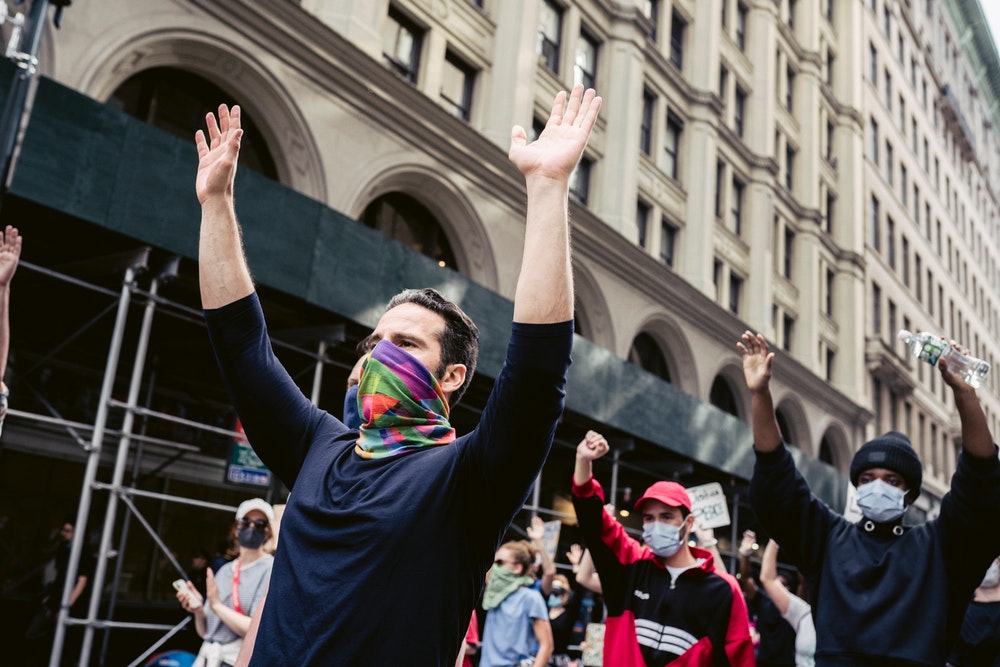Team, I know that in these uncertain times of civil unrest, it’s easy to get overwhelmed. We are all fighting to stay sane and faithful. I pray that God will protect your hearts and minds in Jesus Christ. He has not given us the spirit of fear, but of power, love, and a sound mind (2 Timothy 1:7). We are more than conquerors and predestined to sonship (Romans 8:37, Ephesians 1:5). Remember that the thief comes to steal, kill, and destroy – so be vigilant, and keep your mind on things above (John 10:10, Colossians 3:2).
While we all have our own crosses to bear, we also have a shared obligation to love and care for each other. We are one body with many members (1 Corinthians 12:12). I saw a meme online that said, “Silence equals complicity”. I don’t think that silence is typically meant to be complicit; sometimes, people simply try to protect their peace with avoidance.
But, the Church is called to bring the love of God to the world. Compassion means to have common passion – when one of us suffers, we all suffer. We will pray but prayer alone isn’t enough; we need to continue to speak out against injustice and uplift the down-trodden. The Bible says if you do not love your brother or sister whom you have seen, you cannot love God whom you have not seen (1 John 4:20).
Who Is My Neighbor?
 “A certain man went down from Jerusalem to Jericho, and fell among thieves, who stripped him of his clothing, wounded him, and departed leaving him half dead. Now by chance a certain priest came down that road, and when he saw him, he passed by on the other side. Likewise, a Levite when he arrived at the place, came and looked and passed by on the other side. But a certain Samaritan, as he journeyed came where he was and had compassion. He went to him and bandaged his wounds, set him on his own animal and brought him to an inn, and took care of him. So, which of these three do you think was a neighbor to him who fell among the thieves.” Luke 10:30-36
“A certain man went down from Jerusalem to Jericho, and fell among thieves, who stripped him of his clothing, wounded him, and departed leaving him half dead. Now by chance a certain priest came down that road, and when he saw him, he passed by on the other side. Likewise, a Levite when he arrived at the place, came and looked and passed by on the other side. But a certain Samaritan, as he journeyed came where he was and had compassion. He went to him and bandaged his wounds, set him on his own animal and brought him to an inn, and took care of him. So, which of these three do you think was a neighbor to him who fell among the thieves.” Luke 10:30-36
When we read this parable, we all agree that the good Samaritan was the true neighbor and we condemn the others who simply passed by. But, what really happened here? Were they afraid? Too busy? Did they just feel it best to mind their business?
Maybe this was an extreme example, but how many of us are refusing to get involved or speak up about the tragedies and discrimination we witness every day? We have to be willing to confront these evils if we’re ever going to eradicate them. It’s our responsibility. The world teaches us self-preservation, but the Word teaches us to consider others more important than ourselves (Philippians 2:3).
A Heart to Love Your Neighbor as Yourself
We have to examine our hearts, Team. No one is exempt. Even Peter denied Jesus three times and he was one of the twelve. How we respond during this social climate will reveal what’s in us.
I have seen so many people trying to explain away the racial tension and unrest around the world. Some say we just need to vote for the right leaders. Others say that Black lives should matter more to Blacks before we can expect it to matter to anyone else. Conspiracy theories and rumors spread fear and confusion, leaving people grasping for straws to keep hope alive.
I believe one of the lies the enemy tells us is that we have no power, that our voice will never be heard so what’s the use. Maybe by doing well where we can, praying, and trying to teach our kids the same will help some. The truth is we have to allow ourselves to be hurt. We have to allow the prick we feel in our soul to move us into action.
Denial can sometimes ease our feelings of helplessness, but then we deceive ourselves and leave our neighbors out to dry in their wounded state. When you participate in peaceful protests and use your platform to speak out, believe it or not, you are making a difference.
It encourages others to do the same as a trickle-down effect. There is no way we can live peaceably in the land when some members of our society are being oppressed. We all have a part to play in loving and bringing forth justice, just like our God (Isaiah 61:8). We have to keep pushing, dialoguing, and advocating for equality and prioritize it.
Love Your Neighbor Who’s Different From You
Our differences should only enhance our impact and extend our reach. People of all races and ethnicities have to stop whitewashing diversity in God’s creation. Inclusion doesn’t have to come at the expense of our truths and the realities we experience. I am a born-again believer, washed in the blood of Jesus – and I am also a Black woman.
Sometimes we over-spiritualize these matters because it’s difficult to face them head-on, or because we just don’t know how. It’s understandable, and we’re all learning together. God will see us through this and we’ll make progress as we continue to love our neighbors.
To all of the non-blacks standing with us, who have been hurt or felt compassion about the recent racial protests – we acknowledge and appreciate you!
So, What’s the Play Call?
- Love your neighbor as yourself (Mark 12:31).
- Push past your discomfort and do what you can to stand up for your fellow man.
- If you don’t know where to start, it’s okay. Stay connected, ask your peers, and offer support and prayer.
Be Blessed!




